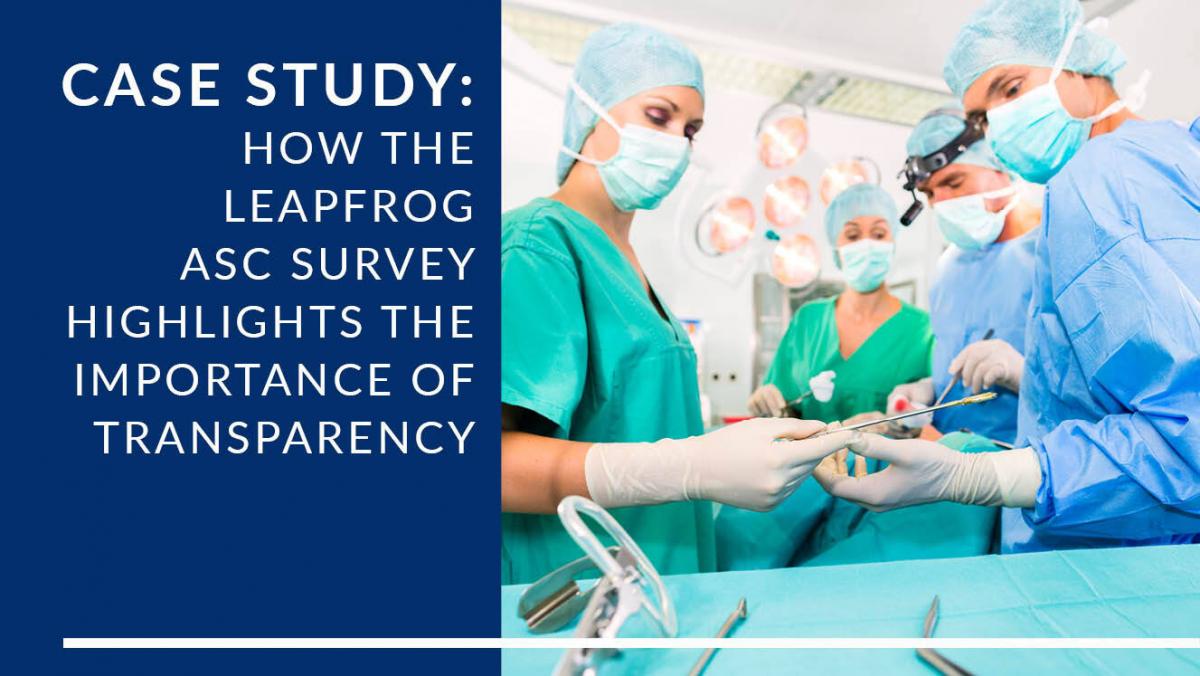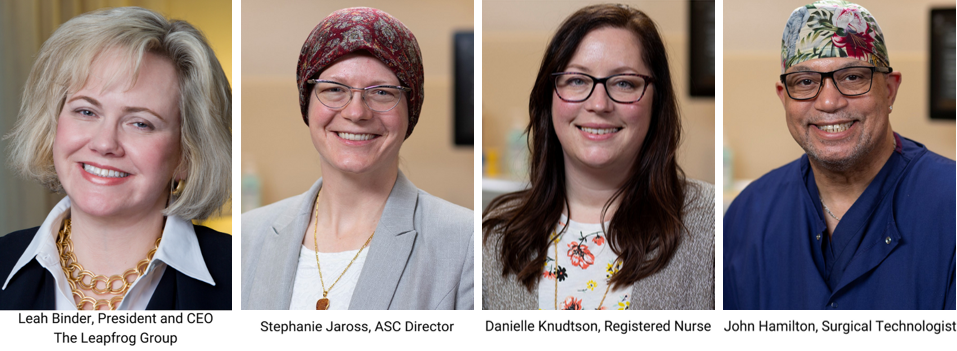
The Leapfrog Group has collected and publicly reported safety and quality information about inpatient care for over 20 years through its Leapfrog Hospital Survey. In 2019, Leapfrog launched the Leapfrog Ambulatory Surgery Center (ASC) Survey to expand its data gathering and reporting enterprise to outpatient care. Many ASCs across the country are making continuous improvement to give patients an exceptional level of care and the Leapfrog ASC Survey provides an opportunity to show patients and their communities that they prioritize transparency.
Despite the immense challenges health care facilities continue to face due to the COVID-19 pandemic, over 2,500 facilities (hospitals and ASCs) have publicly reported data available at Ratings.LeapfrogGroup.org. Both Surveys open April 1 annually and are free for facilities to participate.
The Center for Spine and Joint Replacement Surgery’s Leapfrog Journey
The Center for Spine and Joint Replacement Surgery is an ASC that’s part of Proliance Surgeons based in the western Washington area. This ASC was part of the original pilot for the Leapfrog ASC Survey in 2019 and has continued to participate annually.

In the following interview, Leapfrog president and CEO Leah Binder has a discussion with Stephanie Jaross, ASC Director for the Center for Spine and Joint Replacement Surgery, about their Leapfrog journey. Stephanie is joined by two team members: John Hamilton, a surgical technologist and Danielle Knudtson, a registered nurse.
Leah: You were among the first in the country to participate in the Leapfrog ASC Survey when we launched it in 2019 and you’ve continued to participate since then. That’s really great leadership and I’m excited to hear how it’s gone for you. Why do you participate?
Stephanie: In 2018, I was fairly new to our ASC, and our VP of ASC Operations approached me and a few other surgery centers in our network asking if we’d be interested in participating in the pilot year. I came from a hospital setting and was familiar with Leapfrog and the reputation it has for building transparency and allowing patients to see what facilities are working on. I was really excited for the opportunity and it turns out that a lot of ASCs were also interested. So when Leapfrog opened up the Survey to all ASCs in the U.S., 13 or 14 of our 18 ASCs participated.
"Our ASC has a culture and understanding that we can’t get better if we don’t identify and talk about concerns or mistakes. This level of transparency is essential to show our patients we care about things like infection control and hand washing and employee engagement."
Leah: We are really excited as well to see this interest from ASCs. When we first started, we weren’t sure how many ASCs would complete the Leapfrog ASC Survey, but it’s great to see that so many ASCs value transparency. Why is transparency important to your facility?
Stephanie: There’s a drive across the ASC industry to show patients that we deliver the same, if not better, level of care that hospitals provide. Before Leapfrog, there was not a national platform to show patients, and also each other, what we are working on. Our ASC has a culture and understanding that we can’t get better if we don’t identify and talk about concerns or mistakes. This level of transparency is essential to show our patients we care about things like infection control and hand washing and employee engagement. It’s also good for staff to know this is important to us as leaders.
Leah: Being transparent makes a difference in your community too. We’ve been doing Surveys at the hospital level for over 20 years and we’ve found it’s reassuring to communities and patients when facilities report to Leapfrog. They don’t except perfection, but they do appreciate candor.
One part of the Leapfrog ASC Survey asks about patient follow-up procedures. You go above and beyond in this area. Can you share more about this?
Stephanie: We have an online platform that allows patients – from the beginning of selecting surgery all the way through post-op follow up--to have access to their surgeon. The platform allows patients to input information about their post-op pain levels, how much medication they’re using, and feedback on how they’re doing overall. This information goes back to the surgeon team so they can work on improving outcomes based on what patients are reporting. We also use platforms to collect patient satisfaction information that allows us to benchmark our data with other ASCs nationally. We partner across our system of Proliance Surgeons to reach patients on day 7 and 14 to check in to see if they have any symptoms that might align with COVID-19.
Leah: So if a patient goes home after a procedure and in the middle of the night they’re having a lot of pain, they can communicate it to their surgeon online?
Stephanie: Yes, patients can use this platform as a diary. We also have a 24-hour phone line that patients can call if their pain is not manageable or they have another problem they want to discuss with a doctor.
Leah: Let’s talk about quality improvement now. Did the Leapfrog ASC Survey help you identify areas for improvement in your overall performance?
Stephanie: Yes. There were a couple areas for improvement highlighted for us. One is medication reconciliation. We had a process in place, but it wasn’t robust -- only doing a portion of what Leapfrog was asking for in that section of the Survey. So we dove into our chart audit process starting from home medication reporting and allergies, to verifying orders are made and documented properly, and then the lists are sent home with patients. The second area for improvement was around employee engagement and what we refer to as a culture of safety survey. After participating in the 2019 Leapfrog ASC Survey, we put a stronger priority on prioritizing and administering a culture of safety survey for all ASCs in our organization. In 2020, we were able to report that we did this survey for all ASCs in our network that participated in the Leapfrog Survey. It felt good to be able to show this progress.
Leah: Have you seen progress in medication reconciliation or culture of safety?
Stephanie: Definitely! We haven’t had our repeat culture of safety survey yet, but for medication reconciliation, we have seen great progress. With the way our chart audit functions, we all have input across all levels of medical staff. We’ve seen each other’s work and have identified workflow issues. For instance, we found that our electronic medical record wasn’t documenting medication doses correctly. You don’t see that unless you’re looking at the aftermath of the chart. This has helped us continue to improve our systems for patient care.
"The Leapfrog ASC Survey has helped get all staff on the same platform, working on the same goal of patient safety. From materials management, reception, surgeons, and nurses, we are all equal in this. It helps everyone feel like a part of the team."
Leah: How has the Leapfrog ASC Survey impacted employee morale?
Stephanie: It’s been great for employee morale. I’ll let John and Danielle answer this.
John: The Leapfrog ASC Survey has helped get all staff on the same platform, working on the same goal of patient safety. From materials management, reception, surgeons, and nurses, we are all equal in this. It helps everyone feel like a part of the team.
Leah: That’s terrific. That’s how you create a team – when you all know what the goal is.
Danielle: Leapfrog is in step with the culture we’ve been cultivating from the very beginning. We’ve always had an open, collaborative environment. Leapfrog was easy for us to step into because it is already something we’ve been doing without the name of Leapfrog. The Survey has helped open up discussions with our ASC Director and allows our voices to be heard.
Leah: It’s also really important for your community to know that you were already doing these things. And now you get credit for it publicly by participating in Leapfrog. We set really high standards and you deserve the recognition. Have you found through Leapfrog participation that you’re prioritizing patient safety more, especially in the midst of the pandemic?
Danielle: It’s helped us. Through the pandemic, we’ve learned how agile we can be. Even though it’s hard to change processes, we can do it. We’ve had to train staff and find ways to do things like test patients for COVID-19 before surgeries. Now we’re in a good place with our testing processes and getting results back quickly. This helps us practice in the safest manner possible for staff and patients.
John: Leapfrog participation has helped us tremendously. The Survey has helped us be more transparent for staff, patients, and the community.
Stephanie: The Survey is a check and balance for us. Before participating, I didn’t have good insight into what other ASCs were doing nationally. It’s helped me see what’s important and if we are on the right track. I hope that as the Leapfrog Survey continues to develop, it will help guide all ASCs in quality improvement. That synergy can improve many things for patients.
"You can’t improve unless you find the areas for growth."
Leah: That’s good to hear. We’ll be looking for ASCs like yours because we learn from what you report to us. Do you have advice for other ASCs considering participation in the Leapfrog ASC Survey?
Stephanie: Participating in the Leapfrog ASC Survey is an important step in encouraging your team to know that transparency is important. Being willing to show that we might not be perfect is ok – it gives us an opportunity to improve. Danielle and John also have a perspective to share.
John: The way I see it, why wouldn’t an ASC want to participate? It’s only going to improve your quality. If you don’t, what are you hiding or what are you afraid of? I think that’s what other people think if they don’t see their ASC participating.
Danielle: We didn’t prepare for our first Survey and we weren’t sure how we’d perform. That can be scary. But the reality is, if we want to improve, we have to be willing to remove the shame from the process. You have to identity areas where you have room for growth. You can’t improve unless you find the areas for growth. A lot of credit goes to Stephanie because she creates a safe place to grow.
"It’s my hope that as the Leapfrog ASC Survey continues to develop, it will continue to be a collaborative process between Leapfrog and ASCs. With that, exponential growth is inevitable."
Leah: That’s so inspiring. Congratulations to Stephanie and to your whole organization. You are really making a difference in many lives and especially in your patients’ lives. We appreciate what you do and that you took time to speak with me today.
Stephanie: The pleasure is ours. Thank you for involving us in this today. It’s my hope that as the Leapfrog ASC Survey continues to develop, it will continue to be a collaborative process between Leapfrog and ASCs. With that, exponential growth is inevitable.
Leah: I’m excited to have you at our side as we go forth and make a difference together. Thank you.
About Proliance Surgeons
Proliance Surgeons has been a part of Washington for 20 years with over 450 providers in 100 independent, locally-owned care centers in neighborhoods across the state, helping more than 800,000 patients every year get healthy in orthopedics, ENT, general surgery, ophthalmology, OB/GYN, urology, and more.
